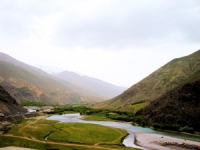Water sharing between Central Asian countries has been conflicting for quite a long time already.
SRI contributions to rice production dealing with water management constraints in northeastern Afghanistan
Rice is a major staple food in Afghanistan, and its production contributes to the food security for millions of Afghans. However, over the past four decades, increases in rice cultivation in the Amu Darya River Basin in the northeastern part of the country are contributing to head/tail inequities in irrigation water-sharing, both at river basin and at canal levels. Since 2007, the Participatory Management for Irrigation System project has been experimenting with the System of Rice Intensification (SRI) as an alternative to the highly water-consumptive traditional method of rice cultivation by inundation of fields. The aim is to introduce a water-saving method for upstream rice-growing farmers to improve the water access for downstream users. To the extent that such a method improves yield, this gives upstream farmers an incentive to switch to this new method which benefits them and, indirectly, other farmers downstream. In 2009, 42 farmers who are cooperating with the Aga Khan Foundation practiced SRI, facilitated through the project’s participatory technology development (PTD) approach. Their average SRI yield, 9.3 tons ha−1, was considerably higher than that obtained with their traditional rice-growing practices. Those farmers who had 2 years of experience with SRI methods and who greater mastery of the techniques got, on average, 65% higher yield than first-year SRI farmers. More-experienced farmers improved their rice production by 27% in comparison to their previous results in 2008. The PTD approach engages the experienced farmers as resource persons to assist new volunteers, promoting local transfer of knowledge. The primary factor in yield improvement was an increase in the number of grains per panicle (+47%). A 10% increase in the number of tillers per square meter, despite lowered plant population, was the second major factor. Yields appeared to be very responsive to an increased number of mechanical weedings. Challenges still remain to be dealt with on the way toward up-scaling, especially as the security situation remains problematic. However, the PTD approach is facilitating work in the field as is cooperation with government personnel.





